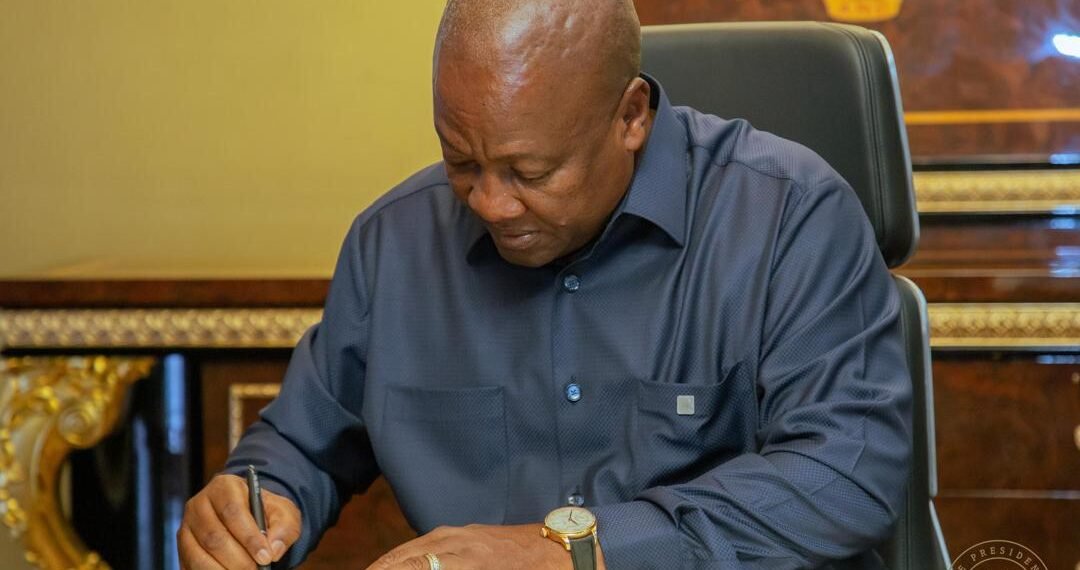President John Dramani Mahama has signed into law eight bills passed by Parliament, marking a significant shift in Ghana’s fiscal policy and fulfilling a major campaign promise by the National Democratic Congress (NDC).
Among the key laws assented to by the President are the repeal of the controversial Electronic Transfer Levy (E-Levy), Betting Tax, and Emissions Levy, which were widely criticized for burdening Ghanaians with excessive taxation.
Hon. Felix Kwakye Ofosu, Presidential Spokesperson and Minister of State in Charge of Government Communications, confirmed the President’s decision in a statement on social media.
“President Mahama has this morning assented to the Bills scrapping the E-Levy, Betting Tax, and Emissions Levy. He also assented to the Bills that will uncap GETFund, NHIL, and RoadFund. Promise made, promise kept.”
Hon. Felix Kwakye Ofosu, Presidential Spokesperson and Minister of State in Charge of Government Communications
This move aligns with the NDC’s pledge ahead of the 2024 general elections to ease the financial strain on citizens, promote accountability, and streamline the country’s tax regime.
The repealed taxes were initially introduced by the NPP previous administration as part of efforts to raise revenue, but they faced widespread public backlash and resistance from business groups and civil society organizations.

List of Bills Signed into Law
The eight bills assented to by President Mahama include the repeal of the Electronic Transfer Levy Act (E-Levy) to eliminate the unpopular tax on mobile money and other electronic transactions.
The Betting Tax Repeal Bill abolishes the taxation of online betting and gaming activities, while the Emissions Levy Repeal Bill removes the environmental tax imposed on vehicle emissions.
Also, the assent of the Earmarked Capping & Re-Alignment Bill uncaps GETFund, NHIL, and RoadFund, allowing full allocation of revenue to these critical sectors.
Moreover, the assent of the Public Financial Management Amendment Bill will strengthen fiscal responsibility and enhance transparency in public financial management, while the Public Procurement Amendment Bill seeks to introduce reforms aimed at improving efficiency and fairness in government procurement processes.
Additionally, the assent of the Value Added Tax (VAT) Amendment Bill will exempt insurance services from VAT, reducing the cost of insurance premiums, while the Petroleum Revenue Amendment Bill seeks to enhance the management and allocation of Ghana’s petroleum revenue.

Reactions to the President’s Decision
The repeal of these taxes has been met with positive reactions from key government officials and stakeholders.
Joyce Bawah Mogtari, Presidential Aide and Advisor, took to social media to express her appreciation, commending President Mahama for honouring his promise made ahead of the 2024 general elections.
“A charge to keep I have. President John Dramani Mahama signs amended bills into law and abolishes the obnoxious E-Levy Act, Betting, and Emissions Tax. Thank you, Sir!”
Joyce Bawah Mogtari, Presidential Aide and Advisor
The E-Levy, in particular, had been a source of intense debate since its introduction, with many Ghanaians opposing the tax on digital financial transactions.
Critics argued that it disproportionately affected small businesses and low-income earners who rely heavily on mobile money services. The decision to scrap the levy is expected to restore confidence in Ghana’s digital economy and encourage financial inclusion.
Similarly, the Betting Tax, which was imposed on winnings from sports betting and online gaming, faced opposition from young people who viewed it as punitive. The tax’s removal is likely to be welcomed by the country’s growing betting community.

The repeal of the Emissions Levy is also seen as a relief for vehicle owners, transport operators, and businesses in the logistics sector, as it eliminates an extra cost associated with compliance.
Again, the decision to uncap the Ghana Education Trust Fund (GETFund), National Health Insurance Levy (NHIL), and Road Fund is expected to improve funding for critical sectors such as education, healthcare, and infrastructure development.
Additionally, the passage of the Public Financial Management Amendment Bill and the Public Procurement Amendment Bill suggests a renewed focus on fiscal discipline and accountability.
The signing of these bills marks a significant milestone in President Mahama’s administration, signaling a shift towards a more transparent and equitable tax system.
The move is widely seen as a strategic effort to fulfill the NDC’s campaign commitment and restore public trust in governance. By reducing the tax burden on citizens, President Mahama aims to boost economic activity and create a more business-friendly environment.
With these reforms, the Mahama administration is sending a clear message that it prioritizes the welfare of Ghanaians while seeking sustainable ways to manage the economy.
READ ALSO: Fuel Prices Surge Amid OMCs Competitive Pressures



















